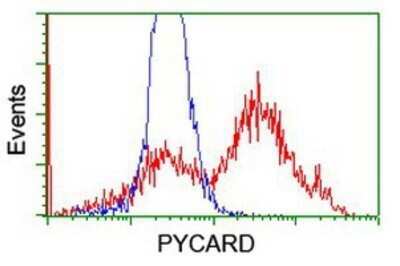ASC/TMS1 Antibody (OTI3E9) - Azide and BSA Free
Novus Biologicals, part of Bio-Techne | Catalog # NBP2-71853

![Western Blot: ASC/TMS1 Antibody (OTI3E9)Azide and BSA Free [NBP2-71853] Western Blot: ASC/TMS1 Antibody (OTI3E9)Azide and BSA Free [NBP2-71853]](https://resources.bio-techne.com/images/products/ASC-TMS1-Antibody-OTI3E9-Azide-and-BSA-Free-Western-Blot-NBP2-71853-img0002.jpg)
Conjugate
Catalog #
Key Product Details
Species Reactivity
Human
Applications
CyTOF-ready, Flow Cytometry, Immunohistochemistry, Immunohistochemistry-Paraffin, Western Blot
Label
Unconjugated
Antibody Source
Monoclonal Mouse IgG1 Clone # OTI3E9
Format
Azide and BSA Free
Concentration
LYOPH mg/ml
Product Specifications
Immunogen
This ASC/TMS1 Antibody (OTI3E9) - Azide and BSA Free was developed against full length human recombinant protein of human ASC/TMS1 (NP_037390) produced in E.coli.
Clonality
Monoclonal
Host
Mouse
Isotype
IgG1
Theoretical MW
21.4 kDa.
Disclaimer note: The observed molecular weight of the protein may vary from the listed predicted molecular weight due to post translational modifications, post translation cleavages, relative charges, and other experimental factors.
Disclaimer note: The observed molecular weight of the protein may vary from the listed predicted molecular weight due to post translational modifications, post translation cleavages, relative charges, and other experimental factors.
Scientific Data Images for ASC/TMS1 Antibody (OTI3E9) - Azide and BSA Free
Western Blot: ASC/TMS1 Antibody (OTI3E9)Azide and BSA Free [NBP2-71853]
Western Blot: ASC/TMS1 Antibody (OTI3E9) - Azide and BSA Free [NBP2-71853] - HEK293T cells were transfected with the pCMV6-ENTRY control (Left lane) or pCMV6-ENTRY ASC/TMS1 (Right lane) cDNA for 48 hrs and lysed. Equivalent amounts of cell lysates (5 ug per lane) were separated by SDS-PAGE and immunoblotted with anti-ASC/TMS1.Immunohistochemistry: ASC/TMS1 Antibody (OTI3E9) - Azide and BSA Free [NBP2-71853]
Immunohistochemistry: ASC/TMS1 Antibody (OTI3E9) - Azide and BSA Free [NBP2-71853] - Staining of paraffin-embedded Carcinoma of Human pancreas tissue using anti-ASC/TMS1 mouse monoclonal antibody.Western Blot: ASC/TMS1 Antibody (OTI3E9)Azide and BSA Free [NBP2-71853]
Western Blot: ASC/TMS1 Antibody (OTI3E9) - Azide and BSA Free [NBP2-71853] - Analysis of extracts (35ug) from 9 different cell lines by using g anti-ASC/TMS1 monoclonal antibody (HepG2: human; HeLa: human; SVT2: mouse; A549: human; COS7: monkey; Jurkat: human; MDCK: canine; PC12: rat; MCF7: human).Applications for ASC/TMS1 Antibody (OTI3E9) - Azide and BSA Free
Application
Recommended Usage
Flow Cytometry
1:100
Immunohistochemistry
1:150
Western Blot
1:500-2000
Formulation, Preparation, and Storage
Purification
Immunogen affinity purified
Reconstitution
we recommend adding 100uL distilled water to a final antibody concentration of about 1 mg/mL. To use this carrier-free antibody for conjugation experiment, we strongly recommend performing another round of desalting process.
Formulation
Lyophilized from PBS (pH 7.3) with 8% Trehalose
Format
Azide and BSA Free
Preservative
No Preservative
Concentration
LYOPH mg/ml
Shipping
The product is shipped with polar packs. Upon receipt, store it immediately at the temperature recommended below.
Stability & Storage
Store at -20C. Avoid freeze-thaw cycles.
Background: ASC
In regard to immune and inflammatory response, ASC/TMS1 is involved in inflammasome function (3-4). The inflammasome is a multiprotein complex that responds to cellular stress or pathogens and activates inflammatory responses. Specifically, ASC/TMS1 helps assemble the NLRP3 inflammasome complex which then activates caspase-1, followed by stimulation of proinflammatory cytokines including IL-1b and IL-18 (3-4). In terms of the role in regulating apoptosis, multiple studies have revealed that the ASC/TMS1 gene is hypermethylated in many cancers including breast, lung, glioblastomas, and melanomas (2-5). The increased methylation results in decreased gene expression, or silencing, allowing those cancer cells to escape apoptosis (2-5).
References
1. Masumoto, J., Taniguchi, S., Ayukawa, K., Sarvotham, H., Kishino, T., Niikawa, N., Hidaka, E., Katsuyama, T., Higuchi, T., & Sagara, J. (1999). ASC, a novel 22-kDa protein, aggregates during apoptosis of human promyelocytic leukemia HL-60 cells. The Journal of biological chemistry, 274(48), 33835-33838. https://doi.org/10.1074/jbc.274.48.33835
2. McConnell, B. B., & Vertino, P. M. (2004). TMS1/ASC: the cancer connection. Apoptosis: an international journal on programmed cell death. https://doi.org/10.1023/B:APPT.0000012117.32430.0c
3. Salminen, A., Kauppinen, A., Hiltunen, M., & Kaarniranta, K. (2014). Epigenetic regulation of ASC/TMS1 expression: potential role in apoptosis and inflammasome function. Cellular and molecular life sciences : CMLS. https://doi.org/10.1007/s00018-013-1524-9
4. Protti, M. P., & De Monte, L. (2020). Dual Role of Inflammasome Adaptor ASC in Cancer. Frontiers in cell and developmental biology. https://doi.org/10.3389/fcell.2020.00040
5. Parsons, M. J., & Vertino, P. M. (2006). Dual role of TMS1/ASC in death receptor signaling. Oncogene. https://doi.org/10.1038/sj.onc.1209684
Long Name
Apoptosis-Associated Speck-Like Protein Containing A CARD
Alternate Names
CARD5, PYCARD, TMS1
Gene Symbol
PYCARD
Additional ASC Products
Product Documents for ASC/TMS1 Antibody (OTI3E9) - Azide and BSA Free
Product Specific Notices for ASC/TMS1 Antibody (OTI3E9) - Azide and BSA Free
This product is for research use only and is not approved for use in humans or in clinical diagnosis. Primary Antibodies are guaranteed for 1 year from date of receipt.
Loading...
Loading...
Loading...
Loading...
Loading...
Loading...
![Immunohistochemistry: ASC/TMS1 Antibody (OTI3E9) - Azide and BSA Free [NBP2-71853] Immunohistochemistry: ASC/TMS1 Antibody (OTI3E9) - Azide and BSA Free [NBP2-71853]](https://resources.bio-techne.com/images/products/ASC-TMS1-Antibody-OTI3E9-Azide-and-BSA-Free-Immunohistochemistry-NBP2-71853-img0007.jpg)
![Western Blot: ASC/TMS1 Antibody (OTI3E9)Azide and BSA Free [NBP2-71853] Western Blot: ASC/TMS1 Antibody (OTI3E9)Azide and BSA Free [NBP2-71853]](https://resources.bio-techne.com/images/products/ASC-TMS1-Antibody-OTI3E9-Azide-and-BSA-Free-Western-Blot-NBP2-71853-img0001.jpg)
![Immunohistochemistry: ASC/TMS1 Antibody (OTI3E9) - Azide and BSA Free [NBP2-71853] Immunohistochemistry: ASC/TMS1 Antibody (OTI3E9) - Azide and BSA Free [NBP2-71853]](https://resources.bio-techne.com/images/products/ASC-TMS1-Antibody-OTI3E9-Azide-and-BSA-Free-Immunohistochemistry-NBP2-71853-img0004.jpg)
![Immunohistochemistry: ASC/TMS1 Antibody (OTI3E9) - Azide and BSA Free [NBP2-71853] Immunohistochemistry: ASC/TMS1 Antibody (OTI3E9) - Azide and BSA Free [NBP2-71853]](https://resources.bio-techne.com/images/products/ASC-TMS1-Antibody-OTI3E9-Azide-and-BSA-Free-Immunohistochemistry-NBP2-71853-img0005.jpg)
![Immunohistochemistry: ASC/TMS1 Antibody (OTI3E9) - Azide and BSA Free [NBP2-71853] Immunohistochemistry: ASC/TMS1 Antibody (OTI3E9) - Azide and BSA Free [NBP2-71853]](https://resources.bio-techne.com/images/products/ASC-TMS1-Antibody-OTI3E9-Azide-and-BSA-Free-Immunohistochemistry-NBP2-71853-img0006.jpg)
![Immunohistochemistry: ASC/TMS1 Antibody (OTI3E9) - Azide and BSA Free [NBP2-71853] Immunohistochemistry: ASC/TMS1 Antibody (OTI3E9) - Azide and BSA Free [NBP2-71853]](https://resources.bio-techne.com/images/products/ASC-TMS1-Antibody-OTI3E9-Azide-and-BSA-Free-Immunohistochemistry-NBP2-71853-img0008.jpg)
